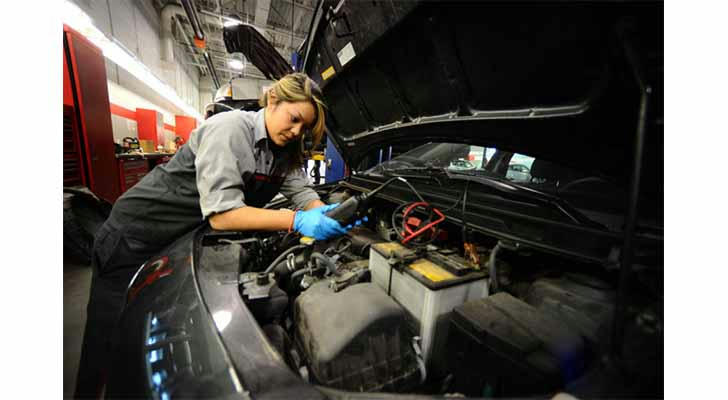Automotive Technicians in the U.S.: Skills, Career Prospects, and Industry Dynamics
Automotive technicians, commonly referred to as auto mechanics, are the backbone of the transportation industry, responsible for diagnosing, repairing, and maintaining vehicles. As modern vehicles incorporate advanced technologies and systems, the role of automotive technicians has evolved from simple mechanical repairs to include complex diagnostics and high-tech problem-solving. With millions of vehicles on U.S. roads, skilled automotive technicians are in high demand, making this an exciting and stable career choice for those passionate about cars and technology.

Role and Responsibilities of Automotive Technicians
Automotive technicians perform a wide range of tasks to ensure vehicles operate safely and efficiently. Their responsibilities include:
Diagnostics and Troubleshooting: Using sophisticated diagnostic tools and software, technicians identify issues in engine performance, electrical systems, and other vehicle components. Modern cars are equipped with onboard computers, requiring technicians to interpret diagnostic codes and pinpoint malfunctions.
Maintenance Services: Routine maintenance tasks such as oil changes, tire rotations, brake inspections, and fluid level checks help extend the lifespan of vehicles and prevent major breakdowns.
Repairs: Technicians repair or replace faulty components, ranging from brake pads and transmission systems to exhausts and air conditioning units. This requires expertise in both traditional mechanical parts and modern electronic systems.
Customer Communication: Auto mechanics often interact with customers to explain the nature of repairs, provide cost estimates, and offer advice on vehicle care. Strong communication skills are essential for building trust and ensuring customer satisfaction.
Keeping Up with Technology: With the rise of electric vehicles (EVs), hybrid models, and advanced safety features like lane-assist and autonomous driving systems, automotive technicians must continuously learn about emerging technologies to remain relevant in the industry.
Essential Skills and Qualifications
Automotive technicians need a blend of technical skills, problem-solving abilities, and a passion for working with vehicles. Key qualifications include:
Technical Proficiency: A deep understanding of vehicle systems, including engines, transmissions, brakes, and electronics, is crucial. Familiarity with diagnostic tools and repair equipment is equally important.
Problem-Solving Abilities: Identifying and resolving issues efficiently requires strong analytical skills and a systematic approach to troubleshooting.
Manual Dexterity: The job involves working with tools in tight spaces, requiring precision and steady hands.
Physical Stamina: Automotive work can be physically demanding, often involving bending, lifting, and standing for long periods.
Continuous Learning: With automotive technology rapidly evolving, technicians must stay up to date through training programs, certifications, and industry resources.

Education and Certification
Becoming an automotive technician typically requires a combination of education, training, and certification:
Education: While some technicians enter the field with only a high school diploma, many employers prefer candidates with formal training from technical schools, community colleges, or vocational programs. These programs cover topics such as engine repair, electrical systems, and diagnostic techniques.
On-the-Job Training: Entry-level technicians often gain hands-on experience through apprenticeships or working under the guidance of experienced mechanics.
Certifications: Industry certifications are highly valued and often required. The most recognized credential is the ASE (Automotive Service Excellence) certification, which demonstrates expertise in specific areas such as brakes, engine performance, or electrical systems. Additional certifications, such as those for hybrid and electric vehicles, can further enhance career prospects.
Career Prospects and Salary
The automotive repair industry offers stable job opportunities, driven by the growing number of vehicles on the road and the complexity of modern automotive systems. According to the U.S. Bureau of Labor Statistics (BLS), the demand for automotive technicians is expected to grow steadily over the next decade.
Salary: As of 2023, the median annual wage for automotive technicians in the U.S. is approximately $46,800, with top earners making upwards of $70,000 or more. Pay varies depending on factors such as experience, location, and specialization. Technicians working in metropolitan areas or for luxury car dealerships often earn higher salaries.
Specialization Opportunities: Technicians who specialize in high-demand areas, such as electric vehicle repair, diesel engines, or performance tuning, can command premium wages and access a broader range of job opportunities.
Challenges and Opportunities in the Industry
While a career as an automotive technician offers numerous benefits, it also comes with challenges:
Complex Technology: The increasing use of electronics, software, and automation in vehicles requires technicians to continually upgrade their skills. However, this also creates opportunities for those who embrace advanced training.
Physical Demands: The job can be physically taxing, involving heavy lifting and exposure to noise, heat, and chemicals. Proper safety measures and ergonomic tools can mitigate these risks.
Seasonal Variations: Automotive repair shops may experience fluctuations in workload, with peak demand during winter and summer months due to seasonal maintenance needs.
On the flip side, the industry offers exciting opportunities for growth and specialization:
Electric and Hybrid Vehicles: The shift toward eco-friendly transportation has created a high demand for technicians skilled in EV and hybrid systems. Training in battery maintenance, charging systems, and electric drivetrains can open doors to lucrative job opportunities.
Fleet Management: Businesses with large vehicle fleets often employ specialized technicians to maintain and repair their vehicles, offering stable employment options.
Entrepreneurship: Many technicians eventually open their own repair shops, allowing them to build a loyal customer base and achieve financial independence.

Emerging Trends in Automotive Repair
The automotive repair industry is rapidly evolving, with several key trends shaping its future:
Electrification: As electric vehicles gain popularity, technicians must adapt to servicing EV-specific components, such as batteries and charging systems.
Digital Diagnostics: Advanced diagnostic tools and software enable quicker and more accurate problem identification, reducing repair times and improving efficiency.
Connected Cars: Vehicles equipped with internet connectivity and advanced telematics provide real-time data, helping technicians predict and address issues before they escalate.
Sustainability: As environmental regulations tighten, repair shops are adopting eco-friendly practices, such as recycling automotive parts and reducing emissions from repair processes.
Conclusion
Automotive technicians are essential to keeping America’s vehicles running smoothly and safely. Their expertise ensures that drivers can rely on their vehicles for daily commutes, long road trips, and everything in between. For individuals with a passion for cars, a knack for problem-solving, and a willingness to adapt to new technologies, this field offers a dynamic and rewarding career.
With steady demand, opportunities for specialization, and advancements in automotive technology, the future for skilled automotive technicians is brighter than ever. By staying current with industry trends and pursuing certifications, technicians can not only secure stable employment but also position themselves at the forefront of this exciting and evolving industry.
